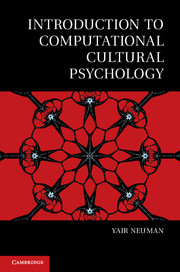Book contents
- Frontmatter
- Dedication
- Contents
- List of Figures
- List of Tables
- Preface
- Acknowledgments
- 1 What is computational cultural psychology?
- 2 The digital psychologist: information technology and cultural psychology
- 3 Why don’t primates have God? Language and the abstraction of thought
- 4 Lost in translation: how to use automatic translation machines for understanding “otherness”
- 5 Spies and metaphors: automatic identification of metaphors for strategic intelligence
- 6 Scent of a woman: the mediation of smell and automatic analysis of extended senses
- 7 Dolly Parton’s love lexicon: detection of motifs in cultural texts
- 8 The relational matrix of the I
- 9 Identifying themes: from the Wingfield family to Harry and Sally
- 10 Eating and dining: studying the dynamics of dinner
- 11 Getting even: the cultural psychology of revenge and what computers can do about it
- Epilogue: on generals and mail coach drivers
- Bibliography
- Author index
- Subject index
10 - Eating and dining: studying the dynamics of dinner
Published online by Cambridge University Press: 05 June 2014
- Frontmatter
- Dedication
- Contents
- List of Figures
- List of Tables
- Preface
- Acknowledgments
- 1 What is computational cultural psychology?
- 2 The digital psychologist: information technology and cultural psychology
- 3 Why don’t primates have God? Language and the abstraction of thought
- 4 Lost in translation: how to use automatic translation machines for understanding “otherness”
- 5 Spies and metaphors: automatic identification of metaphors for strategic intelligence
- 6 Scent of a woman: the mediation of smell and automatic analysis of extended senses
- 7 Dolly Parton’s love lexicon: detection of motifs in cultural texts
- 8 The relational matrix of the I
- 9 Identifying themes: from the Wingfield family to Harry and Sally
- 10 Eating and dining: studying the dynamics of dinner
- 11 Getting even: the cultural psychology of revenge and what computers can do about it
- Epilogue: on generals and mail coach drivers
- Bibliography
- Author index
- Subject index
Summary
Cultural psychology as the study of symbolic systems mediating the variety of human forms of thought and practice (Valsiner 2007) has always been interested in the symbolic value of food and food-related practices (Rozin 2007). Paraphrasing Freud, a food is never just food but always a psychocultural object loaded with meaning derived from associations, connotations, metaphors, and cultural practices in which those senses are embedded and materialized.
Despite the great interest in the symbolic value of food and its related practices, studies that use computational tools to examine the semiotics of food are rare. In this chapter I aim to address this challenge. The chapter is based on a paper I co-authored with my colleagues Daniel Unger, who is an art historian interested in the visual representation of food, and Norbert Marwan, a physicist who has developed sophisticated methods for analyzing dynamic processes. More specifically, we focused our study on one main practice of food consumption: dinner, the main meal of the day in the West.
- Type
- Chapter
- Information
- Introduction to Computational Cultural Psychology , pp. 158 - 168Publisher: Cambridge University PressPrint publication year: 2014



